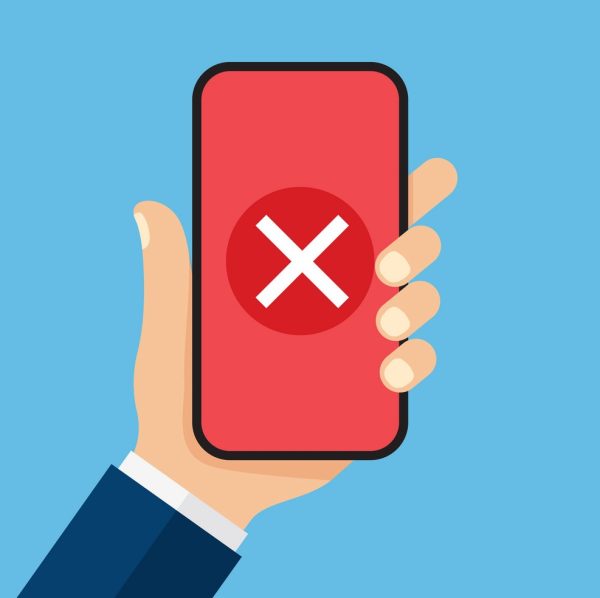Keller is pulling out the plug. Grapevine-Colleyville has killed the line.
Northwest is stopping the signal, too.
Last year, Richardson and Mansfield school districts restricted reception.
Now it’s Weatherford’s turn.
Students arrived at WHS classrooms and were asked to give up a charged asset this Wednesday. Their cell phone.
“Our students will do better if they can stay focused in the classroom,” Principal Dr. William Tommaney said of a cell phone policy.
History teacher Terry Ferguson agrees with the new rule, saying that “cell phones and social media are a distraction,” and they are creating policies that are becoming popular across the country. Some districts have gone to the extreme of taking away phones once students enter the building.
At WHS, students are now expected to leave their device in the designated caddy upon entering the classroom and may regain use of them during passing periods and lunch.
When the use of caddies was brought up, one student who wishes to stay anonymous was concerned about teachers being “expected to purchase them from their own pockets.”
This issue was dispelled by Ferguson, who said, “the school had purchased them for the teachers if they hadn’t already had them, and it wasn’t taken out of their department budget.”
New rules means new punishments, however. Students who choose to ignore the new rule will face three days in ISS. Dr. Tommaney’s goal isn’t to create ways for kids to get into trouble, “our goal is to educate them,” he said. “And common sense tells us that phones can be a distraction.”
He told parents during a meeting Monday in the cafeteria that “it’s really just about improving the quality of instruction in the classroom.”
Some students aren’t so sure.
“If they focused on getting our schedules right instead of putting out stupid rules,” said one student who did not want to be identified, “ then WISD would be a better place.”
This year, more than ever, it seems that student schedules have fallen through the cracks. Could the big push for this cell-phone policy’s approval be to blame?
Junior Amanda Bohanon thinks that the cell phone policy, “is not the smartest.” Bohanon understands that cell phones can be a huge distraction for some students, but for the students who actually use their phone for school purposes, “it feels more like a punishment.”
A different student expressed similar concerns under anonymity, feeling as though “for AP (advanced placement) and Honors students, especially, phones haven’t been an issue.”
Other students hold concerns that create pathways for lack of personal freedoms.
“I know teachers say [to] call the school if it’s that serious, but that’s extremely inconvenient for everyone,” said senior Piper Vanpay, “because not only does the parent have to call the main office, then the secretary has to relay the message or transfer the call, and it disrupts class time more than just letting the parents contact their children.”
This new code could create problems with privacy and leaking personal information, said junior Caleb Ramos, who brought up students with health/mental issues.
“How are they going to call someone in their time of need?” Ramos asked.
These are personal matters which should not be going through multiple staff members before getting to a student or parent, he said.
“Before you say, just ask the teacher, know that teachers are human,” Ramos added. “They can panic when under pressure and aren’t always in the classroom. So, in layman’s terms, this is really dumb.”
Dr. Tommaney told parents WHS has a responsibility to maximize the amount of instructional time students receive, since Texas schools operate based on instructional minutes. Limiting the amount of time students can use their phones at school will, they say, eliminate a big source of disruptions that teachers have to deal with. Ferguson has said that over his decades of teaching that phones have created distractions, which have caused “scores [to be] lower than they used to be, and achievement in the classroom [to be] lower as well.”
“Change is challenging,” Dr. Tommaney added. “The reality is cell phones are a fabric of our lives. I get distracted by mine, and I often have to takes break. I understand people can get upset about these things.”
A select few kids see the benefit to this operation, but have decided to remain anonymous since they know their “opinion is unpopular.” Phones and social media have created a world where no one is truly free from society, and one student said that “this will help us detox from negativity and how quickly things can spread online.”
School may be social, but it doesn’t have to become media. “It might be refreshing to put our phones away and interact with one another, and once we get into the groove [of school], students will see the positives it brings to the table.”
For the majority, though, who see this plan going downhill, they remain doubtful. When the floor was open for questioning, many questions were about how the teachers plan on keeping kids accountable.
Bohanon said if teachers think that the most defiant kids are going to put their “most beloved item” in a caddy, “they have some more thinking to do.”
“Students can lie,” Bohanon said. “They’ll say, ‘oh, I left it at home today,’ or ‘I’m grounded, I don’t even have my phone right now.’ So, I think that the new cell phone policy won’t work very well especially with the students who will do anything but give up their phones for the class period.”


